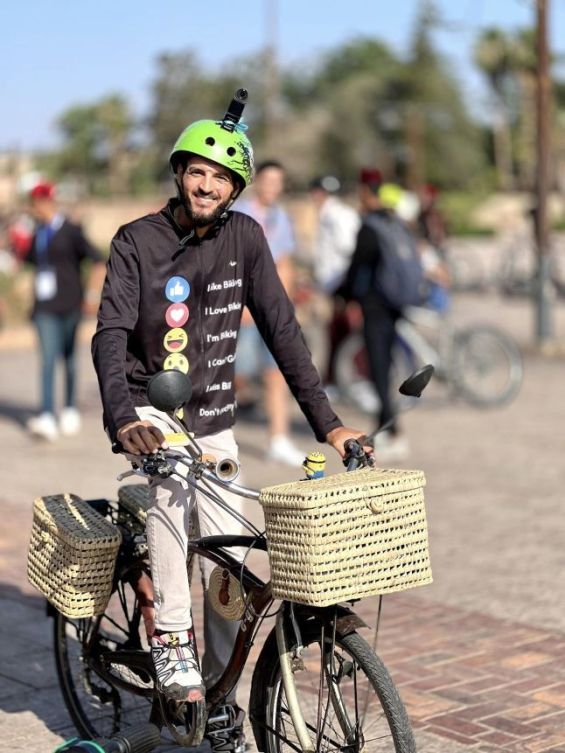He knows every corner of Marrakech's old medina. Born and raised in the Mellah, the city’s historic Jewish quarter, Khalid Aboubi is on a mission to explore and document the streets and neighborhoods of this centuries-old imperial city.
On his bicycle—a beloved mode of transport for many Marrakchis—Khalid navigates the medina’s narrow alleys and iconic neighborhoods, sharing insights on the history behind each street name and landmark.
Through his social media accounts, he posts videos that help visitors discover the city’s hidden paths and provide Marrakchis living abroad with a nostalgic glimpse of home.

Khalid combines two of his passions: cycling and history. «In 2011, I picked up cycling as a hobby. It was inevitable; like any native of Marrakech, you grow up in a house with a bicycle», he told Yabiladi.
Combining two passions
His journey to document the city’s streets and neighborhoods began in 2012. Through a Facebook page he created, he started posting photos and videos of his tours around the Ocher City. At first, his videos were silent, with brief captions providing information on the places he visited.
But as his followers’ enthusiasm grew, they wanted to hear more about the stories behind each neighborhood, and this encouraged him to expand his project. «In my early videos, I didn't speak. I was just riding through the neighborhoods, adding short captions. But eventually, I started narrating», he recalled.
In his videos, Khalid explains the history of each street and neighborhood he visits, sharing the story behind each name and even recounting historical events and anecdotes. His insights reflect both his passion for the city’s rich history and his dedication to his research. «The information I share about Marrakech’s streets and neighborhoods comes from my own humble research, mostly from history books», he emphasized.

In addition to written sources, Khalid relies on oral history, often referred to as folk memory. «I get this from friends, city residents, and sometimes even followers», he noted. «I also make sure to record any interviews where celebrities or notable figures from Marrakech share memories of their childhood in different neighborhoods».
«Marrakech has a rich history. Most neighborhoods are named after walis (Sufi saints), scholars, scientists, or trades, like Souk Semmarine, Souk Nejjarine, or after tribes, like Derb Doukalla and Derb Demrane», Khalid explained.
Streets full of stories
When asked about the most intriguing story he’s uncovered, the Marrakech native shared the tale of the tomb of a woman named Lalla Mimouna Tagnaout. «This tomb sits in the middle of the street, almost like a roundabout», he said. «It was there long before the road, and when they planned the street, they left it as it was».
Local legend claims that when authorities attempted to move the tomb, equipment would break, or workers would fall ill or become paralyzed. «Of course, this remains a folk tale», he added. The tomb is located in front of Bab Dbagh, a historic gate of Marrakech’s medina.
Tombs often hold fascinating stories, and Khalid shared another one, about a woman named Fatima. «She was the daughter of a prominent man during the Saadi dynasty. They say a Saadi sultan wanted to marry her, but she refused», Khalid recounted. The Sultan retaliated by imprisoning her father, and she eventually died unmarried, dedicating her life to teaching women the Quran in Marrakech.
Near Café Koutoubia, close to Jamaa Lefna square, are two more tombs with a unique story. «One tomb is aligned toward Mecca, as per Islamic burial tradition, but the other is not», Khalid noted. He explained that one man was buried during the Almoravid dynasty, and the other during the Almohad rule. «The Almohads and Almoravids didn’t share the same qibla», he explained.
In addition to his insights on the history of the city's streets, Khalid also shows tourists the easiest routes to reach the city's well-known monuments. While riding his bike in Marrakech, he also wears t-shirts raising awareness about road safety, respecting cyclists, and early breast cancer detection.
Despite a long struggle with illness, Khalid remains determined to document the history of Marrakech’s streets. He hopes to one day compile his findings into a book, preserving the stories and history he has lovingly gathered for his beloved city.





 chargement...
chargement...













